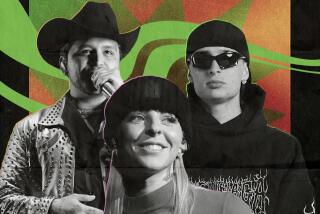ELEKTRIC BAND GIVES COREA A CHARGE
- Share via
Jazz keyboardist/composer Chick Corea has been up to something musical for the last four decades.
For the six-year period from 1978-1984, it was eclectic city.
Starting in 1978, after disbanding his long-standing group Return to Forever--which ranged from four to 13 pieces--he “sort of wandered through a bunch of projects,” as he put it jokingly the other day.
Corea played jazz duos with vibist Gary Burton and trios with bassist Miroslav Vitous and drummer Roy Haynes. He also played classics, such as Mozart’s Double Concerto for Two Pianos and Orchestra (K. 365), which he and pianist Keith Jarrett performed in Tokyo.
But since early 1985, Corea’s focus has been electric city--since the formation of the Chick Corea Elektric Band. The new group, which just completed a 41-concert tour of Europe and Israel, plays Thursday at the Universal Amphitheatre. Wayne Shorter’s quartet and solo guitarist Al DiMeola are also on the bill.
Corea found he really missed leading one band.
“I wanted to take one group of musicians and work one idea and develop it over a period of time, “ the animated 45-year-old said. “I wanted a group that toured, that made records and persisted as one given group.”
The Elektric Band began as a trio--Corea, keyboards, Dave Weckl, drums and John Patitucci, bass--but became a quartet when guitarist Scott Henderson joined earlier this year. The group leans heavily in the jazz/fusion direction with an accent on electronics. And, pun intended, it’s giving Corea quite a charge.
“Man, I’m on my home turf with this group,” he said with characteristic enthusiasm. “I’m havin’ a ball. Dave, John and Scott play with their parts with such feeling and love that they are pleasing me no end.”
The Elektric Band, whose first LP is, logically enough, “Chick Corea Elektric Band” GRP, is designed with young ears in mind.
“I have no prejudice against older people,” he said. “I just like to communicate to young people. Their tastes tend to be less set and, therefore, they’re a bit more willing to accept an idea that might not be within their own framework.”
How does Corea feel about disappointing his acoustic jazz fans with his current plugged-in style? “I’ve always wanted everyone to enjoy what I’m doing, but the reality of life is that tastes vary unbelievably,” he said. “So it’s impossible to make one music that has one kind of flavor that will communicate to everyone.
“In my head, the ideal thing would be for me to play all kinds of different music, both electric and acoustic, maybe combine them on one program. But there’s a definite difference in the way those two musics should be presented. If I bring an electric band into a concert hall, it doesn’t sound right. I’d rather play a gymnasium or outdoors.”
Armando (he was given his sobriquet by an aunt) Corea, a native of Chelsea, Mass., began classical studies at 4. He discovered jazz as a teen-ager, and in the early ‘60s, when he arrived in New York, he played with trumpeter Blue Mitchell, percussionist Mongo Santamaria and saxophonist Stan Getz. In 1968, he joined Miles Davis and was heard on the trumpeter’s ground-breaking jazz/fusion album “Bitches Brew.”
In 1971, he formed Return to Forever, mixing Brazilian, Latin and contemporary jazz genres. “I wanted to tackle the challenge of making high-quality music that communicated broadly,” Corea said. “And it worked.”
Indeed, by 1975, RTF--then a jazz/fusion quartet with Corea, bassist Stanley Clarke, DiMeola and drummer Lenny White--was one of modern music’s most popular bands.
What does the future hold for Corea? “It’s this (Elektric) band,” he said. “I’ve put all my eggs in one basket.”
More to Read
The biggest entertainment stories
Get our big stories about Hollywood, film, television, music, arts, culture and more right in your inbox as soon as they publish.
You may occasionally receive promotional content from the Los Angeles Times.










